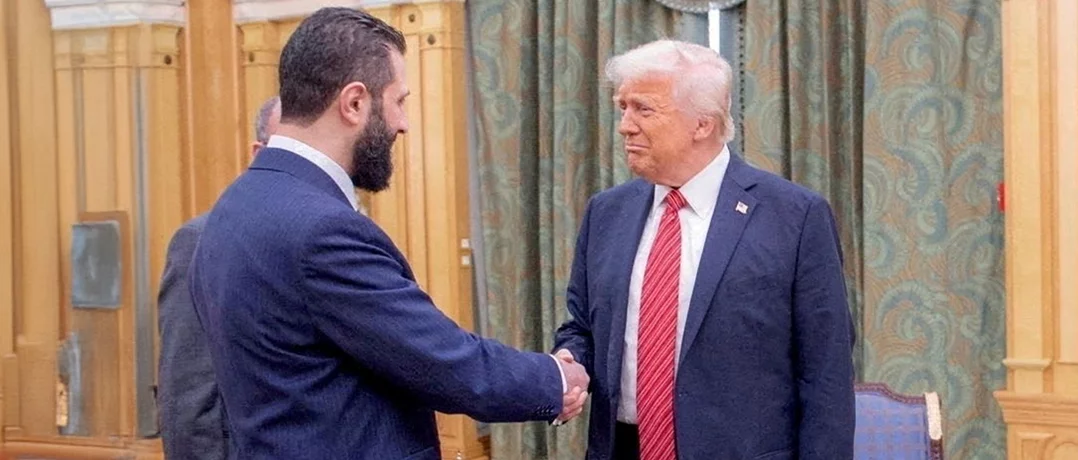US and Syria take a major step toward renewed ties with eased sanctions and restored diplomacy.
Historic White House visit for Syria’s Sharaa
Historic White House visit for Syria’s Sharaa


On November 10, 2025, Syrian interim president Ahmed al-Sharaa visited the White House, marking a major turning point in US-Syrian relations and the first time a Syrian head of state has visited since Syria’s independence in 1946.
The historic meeting between US President Donald Trump and Sharaa came 11 months after the fall of the Assad regime and 6 months after the two leaders’ first meeting in Saudi Arabia.
The talks were framed as a bid to “strengthen and develop” bilateral ties, with Trump commending his counterpart as “a tough guy” from a “tough place” and expressing confidence that Syria could become “very successful.” Sharaa said his past affiliation with al‑Qaeda was behind him and did not come up during the meeting. The latter came after the US removed his designation as a “Specially Designated Global Terrorist.”
While the White House meeting was symbolically significant, Sharaa’s arrival and reception were somehow discreet, as there was no official picture with Trump outside the residence, no joint press conference was held following the meeting and Sharaa even entered through a side door.
From here, three key issues can be discussed from this visit.
Renewed waiver of Caesar Act sanctions
During the meeting, the US Department of the Treasury announced an additional 6-months (or 180 days) suspension of the sanctions under the 2019 Caesar Syria Civilian Protection Act (also known as the “Ceaser Act”), which were imposed on the Syrian government and its allies for war crimes and human rights abuses against civilians during the Syrian Civil War, thus enabling American firms to engage with the Syrian government and state-linked entities.
The move opens the possibility for Syria to reintegrate economically and internationally. US companies may invest, trade and help rebuild infrastructure after the devastation of the civil war, which saw GDP shrink by over 50% since 2010 and per-capita income reverting to low-income thresholds.
However, analysts caution that the waiver is only temporary, as a full repeal of the Caesar Act would require Congressional action and major investors will most likely wait for more lasting clarity before making large commitments. Furthermore, some US lawmakers remain opposed due to ongoing human-rights concerns in Syria (especially with regards to minorities) and believe a sustained monitoring period is required before fully lifting sanctions.
The lifting of diplomatic restrictions
The Syrian government has received a signed decision from Washington restoring full diplomatic activity of its mission and embassy in the United States.
Syrian Foreign Minister Asaad al-Shibani affirmed that “we received a decision signed by my friend, the US Secretary of State, which lifts all previously imposed legal measures on the Syrian mission and the Embassy of the Syrian Arab Republic,” adding that “once again, and not for the last time, Syrian diplomacy affirms its active presence and its ability to make steady progress in removing obstacles and paving the way towards a more open and stable Syrian future.” According to Shibani, this step marks Damascus’ return to “practicing its diplomatic role with full freedom on American soil, as part of the Syrian Ministry of Foreign Affairs’ strategic plan.”
The embassy in Washington, which had been closed for over 12 years (since April 2014) following the US government’s citing of “brutal violations” by the Assad regime, is thus now officially enabled to resume operations. The restoration of diplomatic presence is seen as a major symbolic breakthrough for Syria’s re-entry into the international diplomatic arena and as part of a broader shift in US policy toward Damascus.
Peace talks with Israel
Beyond the bilateral dimension, the aforementioned US initiatives and recent rapprochement with Syria are governed by 3 core priorities: counter-terrorism cooperation to prevent the return of ISIS, reducing Iranian influence in Syria and the region, as well as fostering improved Syrian-Israeli relations. Regarding the latter, particularly, Washington is hoping to possibly bring Damascus into the sphere of the Abraham Accords signed in 2020.
However, in a Fox News interview with Sharaa, the latter declared that his country will not engage in direct negotiations with Israel at this time. He emphasized that Syria’s situation is distinct from nations that entered into the Abraham Accords, while simultaneously noting that the US may serve as an intermediary for limited talks. He described this moment as a new era for Syria, in which Damascus aims to shift from being perceived as a security threat to becoming a geopolitical ally.


